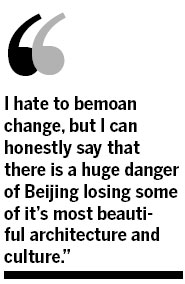Comment
Looking beyond furrowed brows to our capital's historic beauty
By Stuart Wiggin (China Daily)
Updated: 2010-07-02 10:01
 |
Large Medium Small |
For those ex-pats living in Beijing, it is easy for one to focus on the negative aspects of daily life. Many foreigners within China see life here through rose-tinted Western lenses, and as a result, have plenty of criticisms to offer.
However, foreigners, including myself, often forget why living in Beijing is so attractive to us. Somebody once said to me that they preferred Beijing to other Chinese cities due to the fact that life here was such a challenge. I was fascinated by this remark and must admit that I did not, and still do not, agree with this viewpoint. From an outsider's perspective, almost everything in Beijing is a challenge and yet the majority of people that come here stay for long periods of time. So the question is, why?
It is clear to all that Beijing never really sleeps, but within this bustling city, one needn't venture far to discover a more relaxed rhythm - the sound of traditional Chinese instruments resonating from within any one of Beijing's beautiful parks, groups of elderly people dancing or singing in the evening, tables and chairs on the street for the purpose of feasting on barbequed chuanr.
All of these things represent the rather unique and wonderful tempo of Beijing life. These aspects of life are particularly attractive to foreigners such as myself, who hail from cities where individuals within communities tend to be more distant from one another.
And while this closeness remains one of the most interesting and endearing features of Beijing city life, it is also cause for sadness in the sense that certain characteristics look set to disappear with the rise of younger generations.

It is easy to be taken aback by the rapid development of Chinese society and nowhere, aside from Shanghai, can this development be seen so clearly as it can in Beijing.
What is sad, however, about this rapid development, is that modern Chinese society may be too eager to embrace modernism. My favorite historical places in Beijing are not those that are presented as such, but rather those streets or parks that have remained untouched and unnoticed by the majority of passers-by, and are simply regarded as the norm.
Summer is the best season to walk around the streets of Beijing and uncover these historical or cultural gems.
One of the most interesting places in Beijing is situated behind the hutong of Qianmen, where a small row of shops sells ancient artifacts, antiques and art. This area is rarely busy, and is relatively tourist free. Around Qianmen, even mundane doorways can captivate the eye, with intricate stone carvings overlooked by those that live there. I once stood for a half hour trying to taking a photo of a huge Buddhist bust obscured by a van in a scrap yard in the Tongzhou area. Local residents asked me why I was so interested in it. The truth was, it was so alien compared to what can be found in my own country, but for the local residents it was just "in the way", waiting to be collected.
I hate to bemoan change, but I can honestly say that there is a huge danger of Beijing losing some of it's most beautiful architecture and culture, evidenced by the "regeneration" project which plans to demolish part of my favorite area of town.
Change is a great thing but I hope that some things can remain untouched. I am enchanted by those things mentioned above and if these were to disappear as part of the pursuit to create a modern city, then Beijing may lose a great deal of its charm.
China Daily